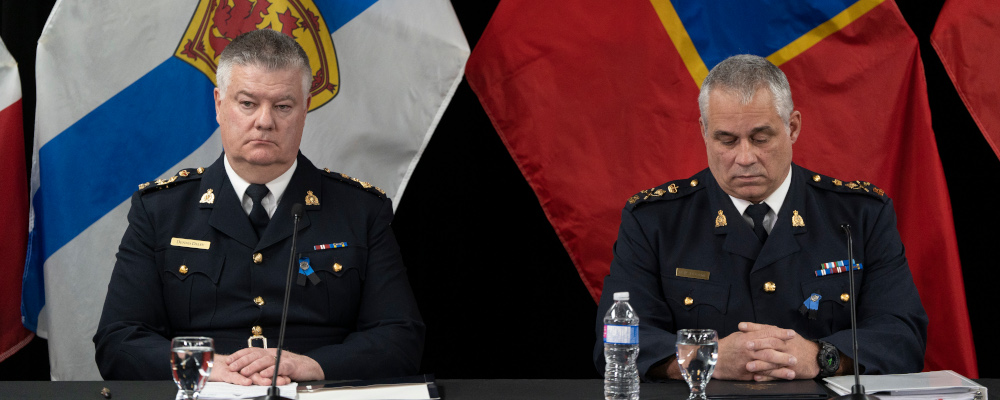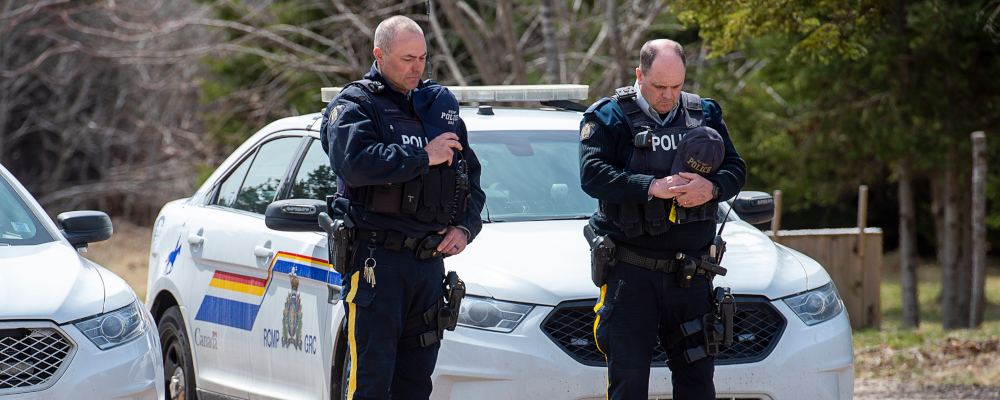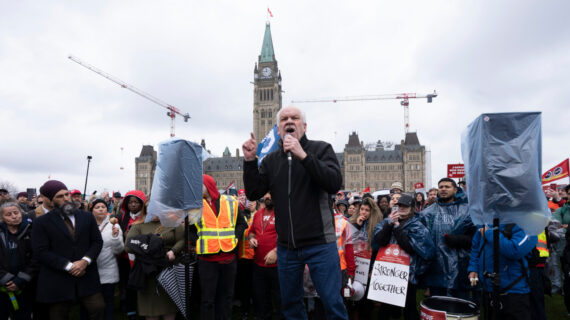This past Easter weekend, Canada silently marked the one-year anniversary of the publication of the Mass Casualty Commission’s damning report into the RCMP’s response to the 2020 Portapique massacre, the worst mass shooting in Canadian history.
In response to a 3,000-page report calling for 130 bedrock reforms to the mounties, Commissioner Michael Duheme could only offer families of victims the faint promise that the force intends to act on those modest areas of reform that are under its control.
The main player for reinventing the RCMP, the federal government, however, was not on the scene to shed any light on its plans for the force. In keeping with the Trudeau government’s weak handling of the foreign interference and reform to the Emergencies Act files, timidity on the anniversary of the MCC report signals a lack of leadership, urgency, and vision on matters of national safety, security—and even identity.
Here is what Prime Minister Justin Trudeau, flanked by Public Safety Minister Dominic Leblanc, to share a little spotlight, should have said last week:
A failure to embark on a radical program to reform the RCMP—by dividing it into two separate entities to handle the very different demands of local law enforcement and federal high policing—would be catastrophic for Canadians and the honourable RCMP officers who serve them. This government will immediately embark on a program to work with the provinces to renew the RCMP. It will be a key part of our larger program to modernize Canada’s architecture for local and federal policing, security, and emergency preparedness, that involves interconnected reforms to the CSIS and Emergencies Acts.
Why should the federal government take this route? The compelling why behind this bold program shift can be found within the report itself, by looking into the depth of the RCMP’s problems during the brutal shooting rampage of April 2020, where a man disguised as an RCMP officer murdered 22 innocent Nova Scotians. Gabriel Wortman, dressed in full RCMP uniform, first shot his neighbours, and then set out in a replica police cruiser on a shooting spree over 200-plus kilometre distance.

The inquiry’s findings
The inquiry found organizational and command-structure confusion, poor communication with the public, and a lack of cooperation with neighbouring police agencies contributed to the duration of the shooting spree. They also concluded there were opportunities missed to bring a troubled person long known to police under control prior to the tragedy. In particular, the MCC focused on the RCMP’s delay in issuing a province-wide emergency warning and its obtuse decision to instead communicate only partial information to the public in rural Nova Scotia via social media. The commission concluded that citizens were “deprived…of the opportunity to evaluate risks and take measures to better protect themselves,” such as staying off the roads and sheltering in place.
Over the course of the inquiry, it came to light that local RCMP command in Nova Scotia had bristled at then Commissioner Brenda Lucki’s alleged repeated pressure on them to share information about the origin and types of guns the shooter had used with the federal government. Lucki had reportedly perceived the government wanted this information to help their interests in selling new gun control legislation to the public. However, local RCMP commanders felt sharing it could compromise their ongoing investigation. The commission then did the heavy lifting of drawing upon previous reviews of the RCMP’s shortcomings, dating back nearly a half-century. They highlighted the many structural reforms that have been repeatedly prescribed, ignored, diluted, or botched by successive federal governments going back to Trudeau Père in the early 1980s.
Reforming the RCMP
Moving in ascending order of complexity, the MCC first focused on reinventing RCMP training for modern policing purposes. This would mean abolishing the paramilitary training model tracing back to the 1880s that they regarded as embodied in the physical environment of their “Depot” training academy in Regina, Saskatchewan.
While I am not as confident in the MCC’s view that it is necessary to shutter Depot entirely, I agree that having only one location for six months of boot camp-style training in rural Saskatchewan is not suitable for attracting educated, diverse recruits from across Canada. I’m also certain that a single model of training cannot possibly prepare recruits for very different futures in local community crime prevention across Canada’s mostly rural environments versus federal policing responsibilities in mostly urban centres. Modern training specific to each set of policing purposes ought to be delivered in regional centres across the country, closer to where new police recruits intend to reside. Very likely, this policing training infrastructure could involve partnerships with postsecondary institutions across the country. There is no reason why the excellent Depot facility could not carry on as one key node in this police training network, partnered with the neighbouring University of Regina.
The second set of recommendations involves reimagining the purpose of the RCMP. The MCC recommended the government undertake an independent review of the feasibility of a single service continuing to provide local policing by contract in largely rural centres and smaller municipalities across the country, separate from those with highly specialised federal policing responsibilities. Responding to domestic disturbance calls or instances of assaults at bars in remote areas at night is very different from receiving actionable intelligence from CSIS to begin a criminal investigation into hate crimes committed by terror groups on Canadian soil. Each requires very different resources and skill sets.

Whether you cleave the RCMP into two separate organizations or have two streams under one organisational roof, the evidence to date (especially in a recent, damning report issued by the National Security and Intelligence Committee of Parliamentarians) indicates the current RCMP structure does not work. It bleeds personnel from federal issues to cover its vast local policing responsibilities. It also leaves newly minted federal police officers uninitiated on the complex new files they must manage. Perhaps the “Royal Canadian Rural Police” and the “Royal Canadian Federal Police” are suitable monikers for two new separate organisations.
To its credit, Mountie brass recently tried to take a small step in this direction. They set up a pilot program to directly recruit specially qualified entrants in federal policing directly to HQ in Ottawa—bypassing the traditional route of all applicants first passing through Depot, spending a decade in local policing, and only then “advancing” to the unrelated field of federal policing. While this is a welcome development (many of my University of Ottawa criminology students, for example, express more interest in a career in the Mounties focused on federal policing functions), there was a glaring problem: RCMP command forgot to involve the Mounties’ police federation (i.e., union) in its program to overhaul recruitment, promotion, and hiring practices. This is a major management and collective agreement “oops” which has placed that pilot initiative on ice.
Desperately needed massive RCMP restructuring won’t only require the union’s go-ahead, but must be informed by a better understanding of the officers already serving. There need to be surveys of RCMP membership to determine what types of policing futures officers would like to concentrate on. For example, questions like who would like to transfer to independent local policing services, and how many might like to be a part of a federal policing-focused service?
Second would be tackling the economics of shifting the federal subsidy of contracted RCMP services (the federal government pays 30 percent of the total cost of the Mountie contracts, in most instances) to help local governments with start-up costs for new independent services or separate revamped, locally-sourced-and-run RCMP units.
This takes us into the most complex and important dimension of RCMP reform detailed by the MCC and the many unheard ancestor reports before it: governance and accountability.
For both local and federal policing to truly be democratic, two things must exist. First, mechanisms to input society’s values and priorities (including those of our weakest citizens) into police policies and approaches—proactively shaping policing through both community knowledge and skilled business management. Second, proper mechanisms to hold the police to account for achieving results within the framework of the Charter.
At present, in all the above dimensions, the RCMP has inadequate governance and accountability for both local and federal policing.

Locally sourced policing
A national police service with officers hailing from across the country that is legislatively responsible to a commissioner and federal minister in Ottawa will never be truly attentive to local communities and their unique needs. They cannot compare to homegrown police services that answer to special city council committees (see Quebec) or independent civilian oversight bodies (see other parts of Canada).
A half-century of RCMP scandals and collapses (1970s harassment of political opponents in the Parti Québecois, anyone?) shows that commissioners too often manage with “one eye looking up,” anticipating the needs (or, more rarely, following the commands) of their political bosses. After all, they are considered a deputy minister, serving at the pleasure of the minister for public safety.
The half-century of recommendations makes it essential that the modest civilian RCMP Management Advisory Board that the Trudeau government has established now be legislatively empowered to act as a real board of management, where the directives of government and the responsibilities of commissioners are overseen.
The status quo cannot go on. As things stand, a beleaguered, poorly structured RCMP leaves Canada a sitting duck to foreign interference, ideologically motivated violence, and global organized crime.
It also leaves RCMP officers under-resourced, stressed, and saddled with an insular and dated culture—all factors that mean the force will continue struggling to retain skilled veterans and recruit diverse members.
Similar to the 1980s, we are at the threshold of a bold triptych of potential reform. The original RCMP Act, CSIS Act, and Emergencies Act were all drafted in the middle of that decade in support of their common purpose to contribute to collective security and national identity, all under the organising wings of the Charter.
But without bold federal action on all three fronts, the Mounties are now on a collision course for organizational collapse. The Trudeau government has only shown timidity on this front, like all governments before it. Plans for this triptych must be front and centre in all of the parties’ platforms when election day 2025 arrives.




